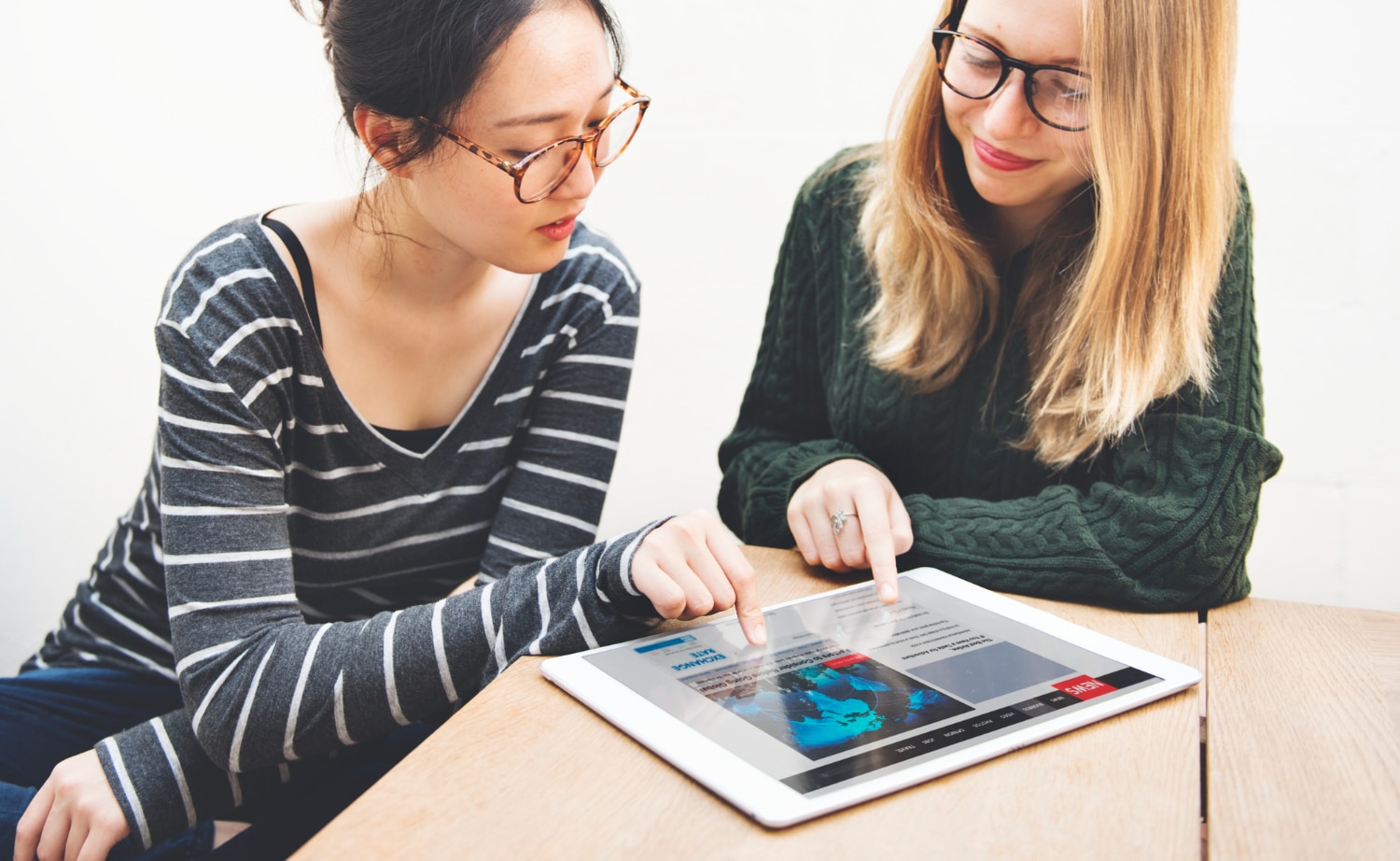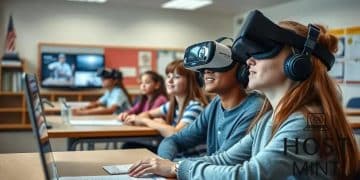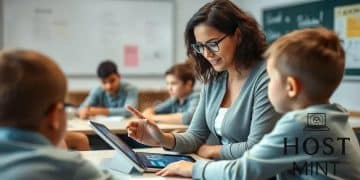Personalized learning models supported by EdTech

Personalized learning models supported by EdTech tailor educational experiences to individual student needs, leveraging technology such as AI and gamification to enhance engagement and effectiveness in learning.
Personalized learning models supported by EdTech are changing how we approach education today. Have you noticed how technology is reshaping classrooms? This article dives into the impact and potential these models have on learning.
Understanding personalized learning models
Understanding personalized learning models is essential in today’s education landscape. As students have different learning styles and paces, these models aim to tailor the educational experience to meet individual needs.
Key Concepts of Personalized Learning
At its core, personalized learning allows students to take control of their educational journeys. By focusing on their strengths and weaknesses, this approach helps learners engage more deeply with content.
Benefits of Personalized Learning Models
- Fosters student engagement and motivation
- Addresses varying learning paces
- Encourages self-directed learning
Moreover, integrating technology in the classroom amplifies these benefits. With tools that adapt to the learner’s pace, students can receive immediate feedback, which is vital for growth.
A key aspect of successful personalized learning is the role of educators. Teachers are not just instructors but facilitators who guide students through their learning paths, helping them set and achieve goals.
Implementing Technology in Personalized Learning
Technology plays a crucial role in enabling personalized learning. Tools such as educational software and learning management systems (LMS) create a customized experience. They can track progress and suggest resources tailored to each student’s needs.
In practice, personalized learning can take many forms. Adaptive assessments, for instance, evaluate a student’s understanding and adjust the difficulty accordingly, making learning more efficient.
The continuous evolution of personalized learning models ensures that education remains relevant. As we harness emerging technologies, the potential for truly individualized learning experiences is greater than ever.
Key technologies in EdTech

Key technologies in EdTech are transforming how students learn and teachers instruct. These innovations are central to creating personalized learning experiences.
Learning Management Systems (LMS)
LMS platforms are essential for organizing and delivering educational content. They provide a structured approach to learning, allowing students to access resources easily.
- Track student progress effectively
- Facilitate communication between teachers and students
- Support resource sharing and collaboration
Furthermore, LMS can host online assessments, enabling educators to gauge student understanding in real-time.
Adaptive Learning Technologies
Adaptive learning technologies adjust content based on students’ performance. By personalizing the learning experience, these tools help address individual strengths and weaknesses.
This approach encourages students to engage with material at their own pace, leading to better retention of information. With adaptive technologies, learners receive immediate feedback and recommendations tailored to their needs.
Another significant innovation in EdTech is gamification. By integrating game-like elements into education, teachers can motivate students to participate actively. This strategy makes learning enjoyable and encourages healthy competition among peers.
Artificial Intelligence in Education
Artificial intelligence (AI) is becoming increasingly influential in education. AI-powered tools can analyze student data to provide insights and predictions about learning behaviors.
The use of chatbots in education is another fascinating application of AI. They provide instant assistance to students, answering questions and guiding them through resources. This support helps students stay engaged and informed.
Incorporating these key technologies in EdTech not only enhances learning but also prepares students for a technology-driven world. As new tools emerge, the educational landscape will continue to evolve, offering limitless possibilities for personalization and engagement.
Benefits for students and educators
The benefits for students and educators in personalized learning models are vast and transformative. These models shift the focus from traditional teaching to a more student-centered approach.
Enhanced Engagement
One of the most significant advantages is increased engagement. When lessons are tailored to meet student needs, learners become more motivated. They connect better with the material, which leads to improved retention of information.
- Students feel more invested in their education.
- Personalized content makes learning enjoyable.
- Engagement leads to better academic performance.
Additionally, when educators implement personalized learning, they can identify areas where students struggle. This insight allows teachers to provide targeted support, ensuring that no student is left behind.
Flexibility in Learning
Another benefit is the flexibility it offers. Students can learn at their own pace, allowing them to explore subjects more deeply when interested. This approach caters to varying learning styles and needs, making education more accessible.
Moreover, educators are better able to adapt lessons based on real-time data, adjusting strategies to fit the classroom’s dynamics.
The use of technology facilitates this flexibility. Online resources and interactive platforms allow learners to engage with content any time and anywhere. Such accessibility empowers students to take charge of their education.
Building Lifelong Skills
By engaging in personalized learning, students develop essential skills, such as critical thinking and problem-solving. They learn how to assess their strengths and weaknesses, being active participants in their education journey.
For educators, embracing these models promotes professional growth. It encourages them to try innovative teaching methods and reflects a shift towards a more collaborative classroom environment.
This synergy between students and educators within personalized learning results in a more effective educational experience. As both groups thrive, the overall learning community benefits, leading to a nurturing and supportive environment.
Challenges in implementing personalized learning
Implementing personalized learning models comes with various challenges that educators and institutions must address. These challenges can impact the effectiveness of personalized learning experiences.
Resource Limitations
One major obstacle is the lack of resources. Schools may not have adequate funding to adopt the latest technologies or training programs. This limitation can hinder the ability to implement effective personalized learning strategies.
- Insufficient access to devices for every student.
- Lack of training for teachers on using EdTech tools.
- Inadequate infrastructure to support online learning.
Additionally, many educators are not familiar with how to integrate technology into their lesson plans. Without proper training, they may struggle to utilize personalized learning effectively.
Resistance to Change
Resistance from both educators and parents can also pose a significant challenge. Some may be hesitant to embrace new methods, favoring traditional teaching styles that they are more comfortable with.
To overcome this, it’s essential to communicate the benefits clearly. Providing evidence of success can help reassure stakeholders that personalized learning is a valuable approach. Moreover, involving teachers in decision-making can help foster a sense of ownership and reduce resistance.
Data Privacy Concerns
Another critical issue is data privacy. As personalized learning often involves collecting and analyzing student data, there are concerns about how this information is stored and used.
Schools must establish strict guidelines to protect student data. Transparency about data usage and opting for secure systems are vital in addressing these concerns.
Despite these challenges, the potential of personalized learning is significant. By recognizing and addressing these hurdles, educators can create a more effective learning environment that meets the needs of all students.
Future trends in EdTech and personalized learning
Future trends in EdTech and personalized learning are evolving quickly as technology advances. These trends aim to improve the educational experience for both students and teachers.
Increased Use of Artificial Intelligence
One significant trend is the rise of artificial intelligence (AI) in education. AI tools can analyze student data to provide personalized recommendations and feedback. This helps educators tailor learning experiences to individual needs.
- AI-powered platforms adapt content in real-time.
- Chatbots assist students with their queries instantly.
- Predictive analytics identify students at risk of falling behind.
As AI continues to develop, its applications in education will expand, making personalized learning more effective.
Growth of Gamification
Gamification is another exciting trend. By incorporating game-like elements into learning, educators can motivate students and make lessons more engaging. This method encourages healthy competition and active participation.
Additionally, through gamification, students can earn rewards and badges that recognize their achievements. This boosts confidence and encourages a love for learning.
Blended Learning Environments
The future will see a rise in blended learning environments, which combine traditional classroom teaching with online learning. This setup allows for flexibility, enabling students to learn at their own pace while still benefiting from live instructor support.
Teachers can use a mix of technology and face-to-face instruction to create a more holistic learning experience. Students benefit from access to a variety of resources and methods that cater to different learning styles.
With these trends, the focus of personalized learning will shift increasingly toward using innovative technologies to foster engagement and support individual growth. The educational landscape will transform, leading to a more interactive and tailored approach to learning.
FAQ – Questions about Personalized Learning Models and EdTech
What is personalized learning?
Personalized learning is an educational approach that tailors instruction to meet the individual needs, skills, and interests of each student.
How does technology enhance personalized learning?
Technology provides tools that adapt content to students’ learning paces and styles, allowing for a more engaging and effective educational experience.
What are the challenges of implementing personalized learning?
Challenges include resource limitations, resistance to change, and concerns about data privacy and security.
What future trends should we expect in EdTech?
Future trends include increased use of artificial intelligence, growth of gamification, and the rise of blended learning environments.






